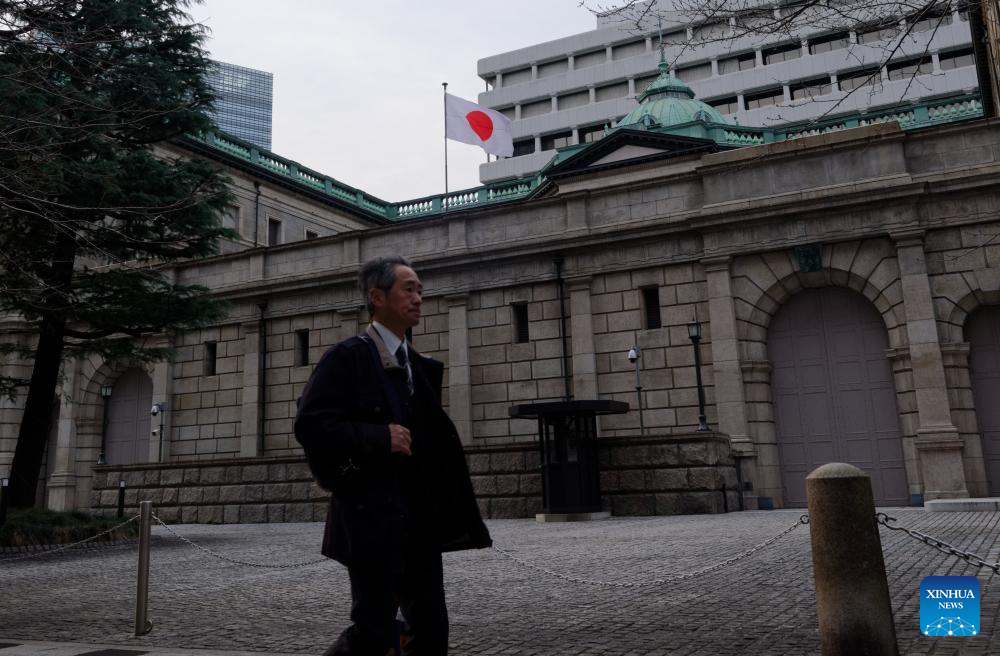
SINGAPORE - The yen hit its weakest level in three decades against the US dollar after the Bank of Japan left interest rates on hold on Friday, leaving traders on edge about the risk of official intervention.
The yen was 0.3 percent weaker at 156.1 per dollar shortly after the BOJ's announcement, its weakest since 1990.
READ MORE: Finance minister: Japan to take all necessary steps to counter yen's dip
The yen also nudged down to its weakest in almost 16 years at 167.38 per euro and its weakest in nearly a decade on the Australian dollar.
The Bank of Japan left its short-term interest rate target at 0-0.1 percent and made only small upward adjustments in its inflation forecast. Markets had not expected a policy shift but investors interpreted the decision as conservative as it did not offer a projection of Japan's path to policy normalization.
The yen's 9.7 percent drop against the dollar this year is the largest fall of any G10 currency, driven mostly by the wide gap between US and Japanese government bond yields, which is more than 375 basis points at the 10-year tenor
"The currency takeaway is certainly disappointment from the lack of guidance coming from the Bank," said National Australia Bank strategist Rodrigo Catril.
"To me the ... market is telling us it believes that the BOJ policy is too loose and hence why the currency is so weak," he said.
ALSO READ: Currency official: Japan does not rule out any measures to counter weak yen
"The Bank has the ability to do something about that by changing its policy, and if it's not going to change the policy, then we shouldn't expect the yen to strengthen."
The focus now falls on Governor Kazuo Ueda's tone and outlook at his news conference at 3:30 pm in Tokyo (0630 GMT) and whether the yen's weakness prompts an official response.
"If dollar/yen keeps going up, (intervention) wouldn't surprise ... given you've had a lot of yen weakness and a lot of very public pushback from Japanese officials," said Joe Capurso, head of international economics at the Commonwealth Bank of Australia.
"The market's not really taken it seriously, so at some point they'll draw a line in the sand and say enough is enough."
The yen's 9.7 percent drop against the dollar this year is the largest fall of any G10 currency, driven mostly by the wide gap between US and Japanese government bond yields, which is more than 375 basis points at the 10-year tenor.
The yen has slipped past levels at 152 and 155 to the dollar where traders had been wary of intervention. Japanese Finance Minister Shunichi Suzuki said on Friday he was closely watching currency moves and prepared to take full steps in response.
READ MORE: IMF tells Asian central banks not to follow Fed too closely
Elsewhere the dollar had dipped on softer-than-expected US growth data, even as Treasury yields rose on a hotter-than-expected inflation indicator.
The euro rose 0.3 percent on Thursday to a two-week high of $1.0728 following data showing the US had grown at its slowest pace in nearly two years in the first quarter. The annualized rate of 1.6 percent missed economist forecasts for 2.4 percent.
The Australian dollar, which has been boosted by a hotter-than-expected inflation reading this week, briefly topped its 200-day moving average to hit $0.6539, before settling around $0.6522 in Asia trade on Friday.
Sterling rose 0.4 percent on Thursday and was last at $1.2503. The New Zealand dollar was a touch firmer in Asia morning trade at $0.5960 and has gained in the previous four sessions.


